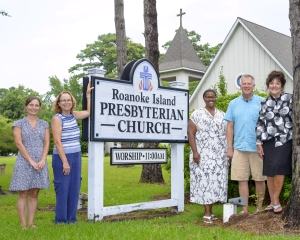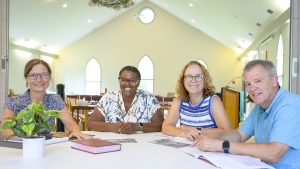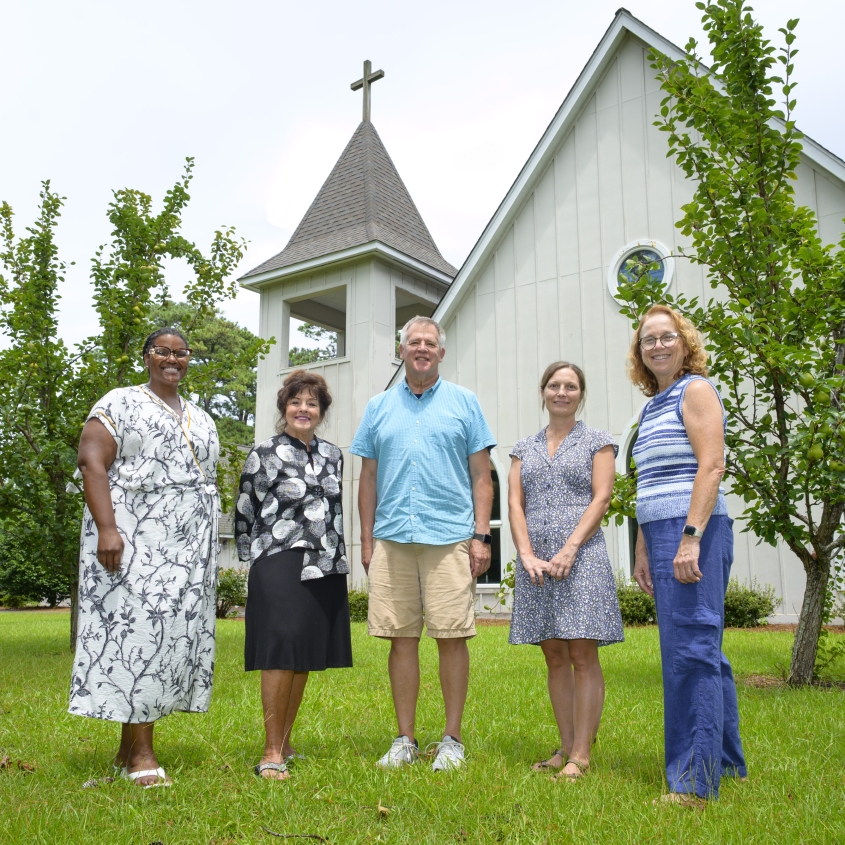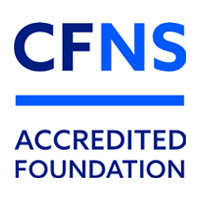Roanoke Island Presbyterian Church Awarded Community Foundation’s Inaugural Focus Grant For Workforce Housing Project

Roanoke Island Presbyterian Church housing committee members. L-R- Dr. Blythe Hayes, Hope Guiley, Rev. Dr. Michelle Lewis, David Guiley, and Kathy Spencer. Photo courtesy of Biff Jennings.
By Tatum Clements
Housing touches nearly every part of our community—schools, public safety, healthcare, and more—and it is no secret that there is a shortage of workforce housing in Dare County.
In 2024 the average home price in Dare County was $622,000 with long-term rental rates between $1,800 and $2,000 per month for a two bedroom home, according to the Dare Community Housing Task Force’s 2024 report. The report also notes that the average median two-person household income for Dare County residents is $58,750.
Average annual salaries have stagnated while home prices have continued to rise in Dare County, making it increasingly difficult for residents to find housing.
The North Carolina Housing Coalition states that 52% of renters and 25% of homeowners in Dare County have difficulty affording their homes.
Housing insecurity has created a ripple effect across the Outer Banks deeply affecting businesses, essential personnel, and individuals in the community.
While many people have been actively trying to solve the workforce housing crisis in Dare County, no one has cracked the code.
In an effort to tackle some of the region’s most pressing challenges, including healthcare access, affordable housing, and child care, the Outer Banks Community Foundation (OBCF) created their new Focus Grant initiative at the end of 2024.
“The Focus Grant provides funding up to $50,000 and was designed to support innovative, large-scale projects that address critical needs within the Outer Banks community, with a potential for multi-year awards,” said Frank Hester, Chair of OBCF’s Grants Committee.

Roanoke Island Presbyterian Church housing committee members Dr. Blythe Hayes, Rev. Dr. Michelle Lewis, Hope Guiley, and David Guiley working on their project. Photo courtesy of Biff Jennings.
When a group of concerned citizens at Roanoke Island Presbyterian Church (RIPC) learned about the Focus Grant they saw an opportunity for a housing project idea that they were already working on.
“We have spent the last nine months working with the Ormond Center at Duke Divinity School to determine how the church can use our resources to best serve our community,” said Rev. Dr. Michelle Lewis who is the pastor at Roanoke Island Presbyterian Church. “The more we talked about it, we said ‘housing is the biggest need in our community’. Our schools need teachers, and our community needs public service employees, and these people need places to live. Working with the Ormond Center at Duke Divinity School has given us a realistic understanding of what it will take to make workforce housing happen in this community. We want to use the church to fulfill our mission.”
Out of a handful of applicants, the Focus Grant application from Roanoke Island Presbyterian Church to develop housing for essential workers on church property stood out.
“What intrigued us about the application was the church’s interest in creating a new model that inspires churches and nonprofit organizations to undertake additional projects,” said OBCF President & CEO Chris Sawin. “It’s pretty clear that the government can’t just wave a magic wand and solve the housing problem – the way our community must address it is through lots of little projects that together, make a big impact.”
This summer, Roanoke Island Presbyterian Church was awarded the Community Foundation’s inaugural Focus Grant to develop workforce housing on their two-acre property.
“Roanoke Island Presbyterian Church is extremely grateful for the support the Community Foundation is providing to move us toward solving the local housing crisis,” said RIPC housing committee member David Guiley.
Prior to receiving the grant, the church’s housing committee had completed the initial phase of the project, including meetings with the Town Manager, a local architect, a local engineer, a member of the Dare County Housing Task Force, and other community stakeholders.
The Focus Grant will enable RIPC to enter the next phase of the project, which involves a feasibility study, the initial architectural plans, and the site design.
“The grant takes us from an idea to a plan of action,” added Lewis. “We are now moving forward in a meaningful way. Once we have the logistics in place for the project, we will be able to begin fundraising to build.”
The church’s goal is to be able to build 12 workforce housing units on their property that would provide housing for teachers, EMTs, and other public service employees. Teacher housing is available on Hatteras Island and in Kill Devil Hills, but not on Roanoke Island, so helping address that need is one of RIPC’s priorities.
Along with addressing the immediate need for workforce housing in Dare County, another thing that stood out to the Community Foundation about RIPC’s idea was the replicability of this project for other local nonprofits to find innovative, small ways to address bigger issues within the community.
“One of the things that is important to us is finding ways to use our church in non-church ways,” said RIPC housing committee member Dr. Blythe Hayes. “We want to serve the community in a way that the community most needs. We hope the model we develop with this project will be a model that other churches and nonprofit organizations in our community will be able to use as they continue the work of creating housing on the Outer Banks.”
While the project is a large undertaking, the Community Foundation applauds RIPC for thinking outside the box on Dare County’s housing crisis.
“We were truly inspired by RIPC’s creative and forward-thinking approach,” said OBCF’s Chief Operating Officer Nandy Stuart. “What may seem like a relatively small project has the potential to spark a much larger movement—one where churches and nonprofits across the Outer Banks reimagine how their properties can serve the community’s most pressing needs. That’s exactly what our grants program is about: empowering bold, replicable solutions that address both urgent challenges and promising opportunities.”
Dare County is not alone in facing housing challenges. According to the Community Foundation Awareness Initiative study, community foundations nationwide are deeply engaged in housing solutions, combining traditional grants with strategies such as leveraging financial assets, influencing policy, and orchestrating collaborations to collectively scale their impact and expand access to affordable housing.
The Outer Banks Community Foundation’s next grant application deadline is Friday, October 31 for Impact Grants, which are open to all types of projects with no restrictions on scope or focus and have funding requests exceeding $10,000.Nonprofits are encouraged to visit the Community Foundation’s website for detailed guidelines, eligibility criteria, and the application portal. Early submissions are encouraged to allow time for review and feedback.
For more information or assistance with the grant application process, visit OBCF.org/grants or contact the staff at 252-423-3003.





